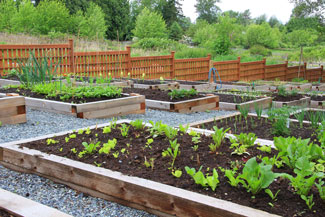How to start a community garden
Much has been written of Community Gardens of late. We all know gardening is good for us, we need more green spaces and that there are numerous benefits afforded by community gardens. But few offer advice on how to start one. Why?
The rules and regulations set down by Councils and Government can put people off establishing community gardens. But don’t be afraid… As treehugger.com reports, your Council is here to work with you and as long as you consult them and abide by ‘the rules’ everything should be hunky dory!
- Start talking about a community garden. The greater the interest the greater the likelihood it will ‘get off the ground’ so to speak.
- Find some land. Remember to get the land owner and/or Council’s permission because we wouldn’t want your efforts to be uprooted!
- Secure funding & supplies. There may be grants available and/or your local garden centre, nursery or dry goods suppliers may be able to help you.
- Have a working bee. The more the merrier and when they see the results they’ll continue to take an active part.
- Bigger isn’t always better. Make sure that the size is manageable on an ongoing basis and that everyone who’s actively involved has a patch of their own.
- Start composting. Compost provides much needed nutrients for your garden and most importantly, by using fruit and vege scraps, it minimises your rubbish collection.
- Start seedlings at home. Members can start seedlings at home. If they’ve reared them they’re more likely to take better care of them.
- Keep pests at bay. Take practical steps to keep pests at bay and if it’s in a public area you may need to fence off the garden to prevent pets destroying it!
- Organise a roster. Assign who is responsible for what and when early on in the piece. A successful community garden is reliant on people doing what they should when they should.
- No such thing as a free lunch. If people aren’t interested in helping in some way they should not get any of the end results - fruit, veges, flowers, seedlings, plants etc.
- Engage with local gardening legends. Identify some of the best gardens in the neighbourhood and ask these people to be involved. Their personal gardens will provide inspiration for development of the community garden.
Once your community garden is established…
- Provide information sheets about the garden for people to take away.
- Hold community events there.
- Invite guest speakers to give presentations.
- Enhance your space with table, chairs and sun umbrellas.

14-Sep-2014


